Ethics in Auditing: Case Studies, Analysis and Solutions - Finance
VerifiedAdded on 2021/06/15
|7
|2497
|124
Homework Assignment
AI Summary
This document contains solutions to an auditing ethics assignment, addressing various scenarios and ethical dilemmas faced by auditors. The assignment analyzes cases involving conflicts of interest, gifts, professional competence, confidentiality breaches, and threats to independence. The solutions discuss the violation of fundamental principles such as objectivity, integrity, and professional care, as per APES 110 and other professional standards. The document also examines advocacy and intimidation threats. It provides detailed explanations of how ethical principles are compromised in each situation, offering insights into maintaining ethical conduct in auditing practices. The assignment covers different cases, including scenarios involving gifts, conflicts of interest, and breaches of confidentiality, providing a comprehensive overview of ethical challenges in the field of auditing.
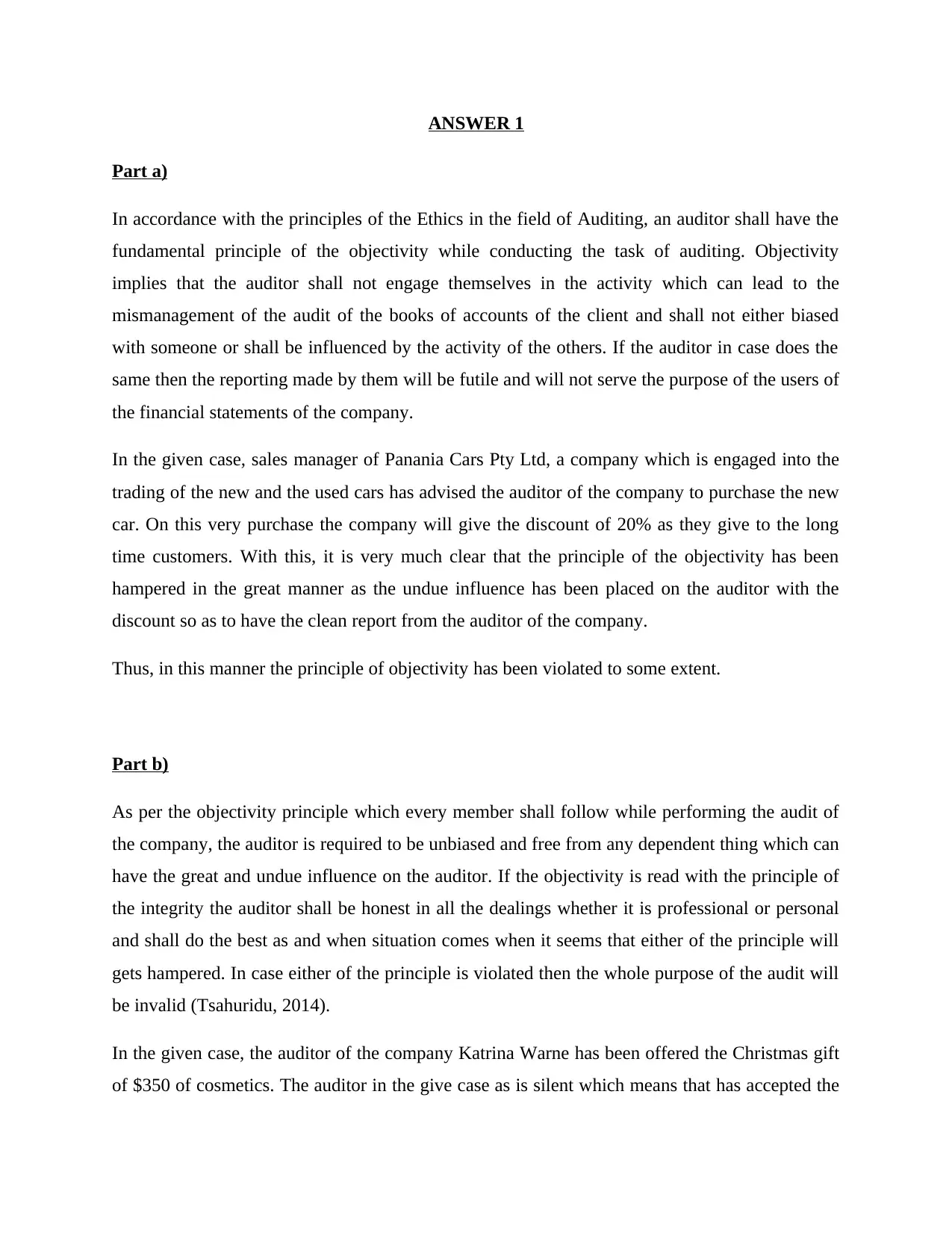
ANSWER 1
Part a)
In accordance with the principles of the Ethics in the field of Auditing, an auditor shall have the
fundamental principle of the objectivity while conducting the task of auditing. Objectivity
implies that the auditor shall not engage themselves in the activity which can lead to the
mismanagement of the audit of the books of accounts of the client and shall not either biased
with someone or shall be influenced by the activity of the others. If the auditor in case does the
same then the reporting made by them will be futile and will not serve the purpose of the users of
the financial statements of the company.
In the given case, sales manager of Panania Cars Pty Ltd, a company which is engaged into the
trading of the new and the used cars has advised the auditor of the company to purchase the new
car. On this very purchase the company will give the discount of 20% as they give to the long
time customers. With this, it is very much clear that the principle of the objectivity has been
hampered in the great manner as the undue influence has been placed on the auditor with the
discount so as to have the clean report from the auditor of the company.
Thus, in this manner the principle of objectivity has been violated to some extent.
Part b)
As per the objectivity principle which every member shall follow while performing the audit of
the company, the auditor is required to be unbiased and free from any dependent thing which can
have the great and undue influence on the auditor. If the objectivity is read with the principle of
the integrity the auditor shall be honest in all the dealings whether it is professional or personal
and shall do the best as and when situation comes when it seems that either of the principle will
gets hampered. In case either of the principle is violated then the whole purpose of the audit will
be invalid (Tsahuridu, 2014).
In the given case, the auditor of the company Katrina Warne has been offered the Christmas gift
of $350 of cosmetics. The auditor in the give case as is silent which means that has accepted the
Part a)
In accordance with the principles of the Ethics in the field of Auditing, an auditor shall have the
fundamental principle of the objectivity while conducting the task of auditing. Objectivity
implies that the auditor shall not engage themselves in the activity which can lead to the
mismanagement of the audit of the books of accounts of the client and shall not either biased
with someone or shall be influenced by the activity of the others. If the auditor in case does the
same then the reporting made by them will be futile and will not serve the purpose of the users of
the financial statements of the company.
In the given case, sales manager of Panania Cars Pty Ltd, a company which is engaged into the
trading of the new and the used cars has advised the auditor of the company to purchase the new
car. On this very purchase the company will give the discount of 20% as they give to the long
time customers. With this, it is very much clear that the principle of the objectivity has been
hampered in the great manner as the undue influence has been placed on the auditor with the
discount so as to have the clean report from the auditor of the company.
Thus, in this manner the principle of objectivity has been violated to some extent.
Part b)
As per the objectivity principle which every member shall follow while performing the audit of
the company, the auditor is required to be unbiased and free from any dependent thing which can
have the great and undue influence on the auditor. If the objectivity is read with the principle of
the integrity the auditor shall be honest in all the dealings whether it is professional or personal
and shall do the best as and when situation comes when it seems that either of the principle will
gets hampered. In case either of the principle is violated then the whole purpose of the audit will
be invalid (Tsahuridu, 2014).
In the given case, the auditor of the company Katrina Warne has been offered the Christmas gift
of $350 of cosmetics. The auditor in the give case as is silent which means that has accepted the
Paraphrase This Document
Need a fresh take? Get an instant paraphrase of this document with our AI Paraphraser
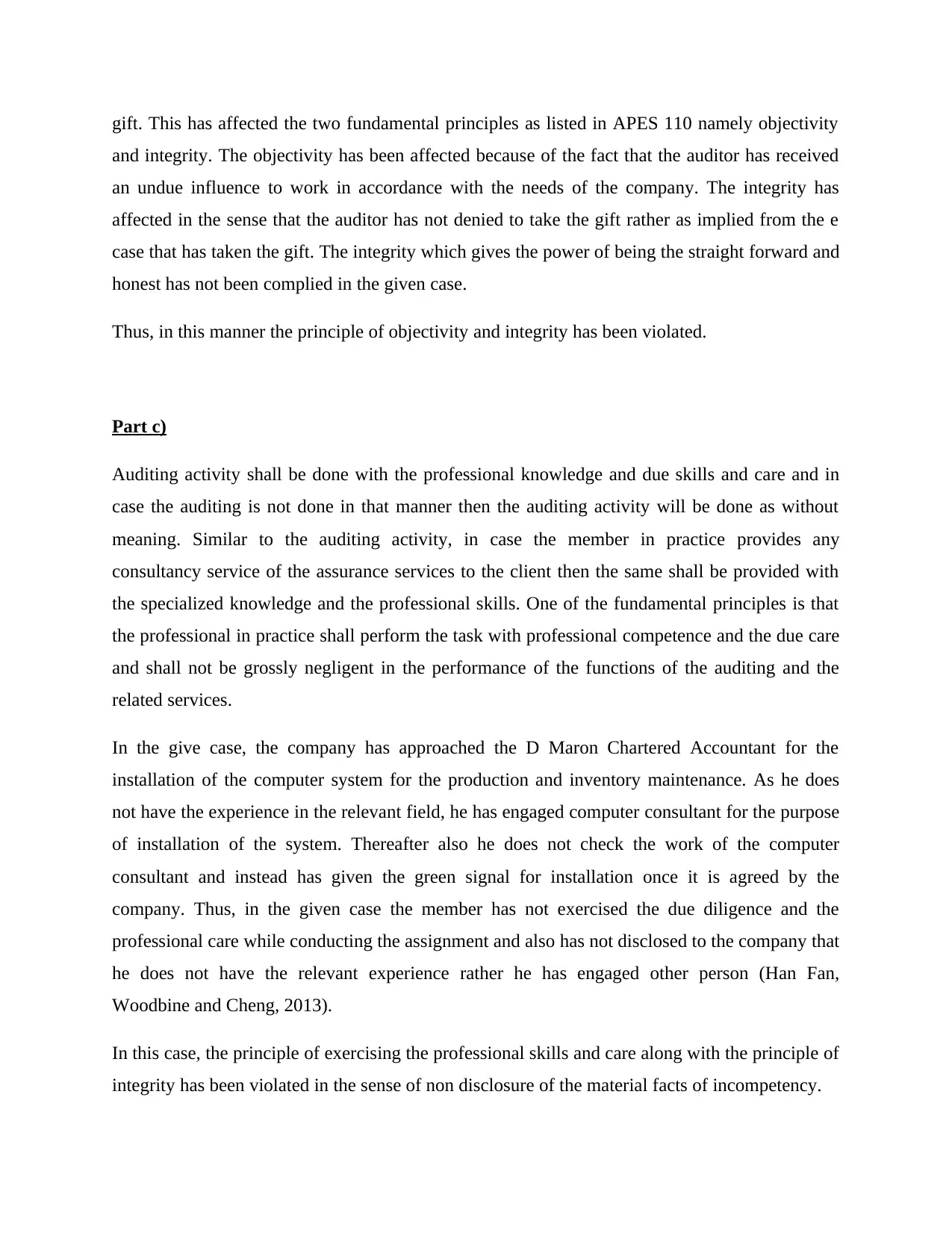
gift. This has affected the two fundamental principles as listed in APES 110 namely objectivity
and integrity. The objectivity has been affected because of the fact that the auditor has received
an undue influence to work in accordance with the needs of the company. The integrity has
affected in the sense that the auditor has not denied to take the gift rather as implied from the e
case that has taken the gift. The integrity which gives the power of being the straight forward and
honest has not been complied in the given case.
Thus, in this manner the principle of objectivity and integrity has been violated.
Part c)
Auditing activity shall be done with the professional knowledge and due skills and care and in
case the auditing is not done in that manner then the auditing activity will be done as without
meaning. Similar to the auditing activity, in case the member in practice provides any
consultancy service of the assurance services to the client then the same shall be provided with
the specialized knowledge and the professional skills. One of the fundamental principles is that
the professional in practice shall perform the task with professional competence and the due care
and shall not be grossly negligent in the performance of the functions of the auditing and the
related services.
In the give case, the company has approached the D Maron Chartered Accountant for the
installation of the computer system for the production and inventory maintenance. As he does
not have the experience in the relevant field, he has engaged computer consultant for the purpose
of installation of the system. Thereafter also he does not check the work of the computer
consultant and instead has given the green signal for installation once it is agreed by the
company. Thus, in the given case the member has not exercised the due diligence and the
professional care while conducting the assignment and also has not disclosed to the company that
he does not have the relevant experience rather he has engaged other person (Han Fan,
Woodbine and Cheng, 2013).
In this case, the principle of exercising the professional skills and care along with the principle of
integrity has been violated in the sense of non disclosure of the material facts of incompetency.
and integrity. The objectivity has been affected because of the fact that the auditor has received
an undue influence to work in accordance with the needs of the company. The integrity has
affected in the sense that the auditor has not denied to take the gift rather as implied from the e
case that has taken the gift. The integrity which gives the power of being the straight forward and
honest has not been complied in the given case.
Thus, in this manner the principle of objectivity and integrity has been violated.
Part c)
Auditing activity shall be done with the professional knowledge and due skills and care and in
case the auditing is not done in that manner then the auditing activity will be done as without
meaning. Similar to the auditing activity, in case the member in practice provides any
consultancy service of the assurance services to the client then the same shall be provided with
the specialized knowledge and the professional skills. One of the fundamental principles is that
the professional in practice shall perform the task with professional competence and the due care
and shall not be grossly negligent in the performance of the functions of the auditing and the
related services.
In the give case, the company has approached the D Maron Chartered Accountant for the
installation of the computer system for the production and inventory maintenance. As he does
not have the experience in the relevant field, he has engaged computer consultant for the purpose
of installation of the system. Thereafter also he does not check the work of the computer
consultant and instead has given the green signal for installation once it is agreed by the
company. Thus, in the given case the member has not exercised the due diligence and the
professional care while conducting the assignment and also has not disclosed to the company that
he does not have the relevant experience rather he has engaged other person (Han Fan,
Woodbine and Cheng, 2013).
In this case, the principle of exercising the professional skills and care along with the principle of
integrity has been violated in the sense of non disclosure of the material facts of incompetency.
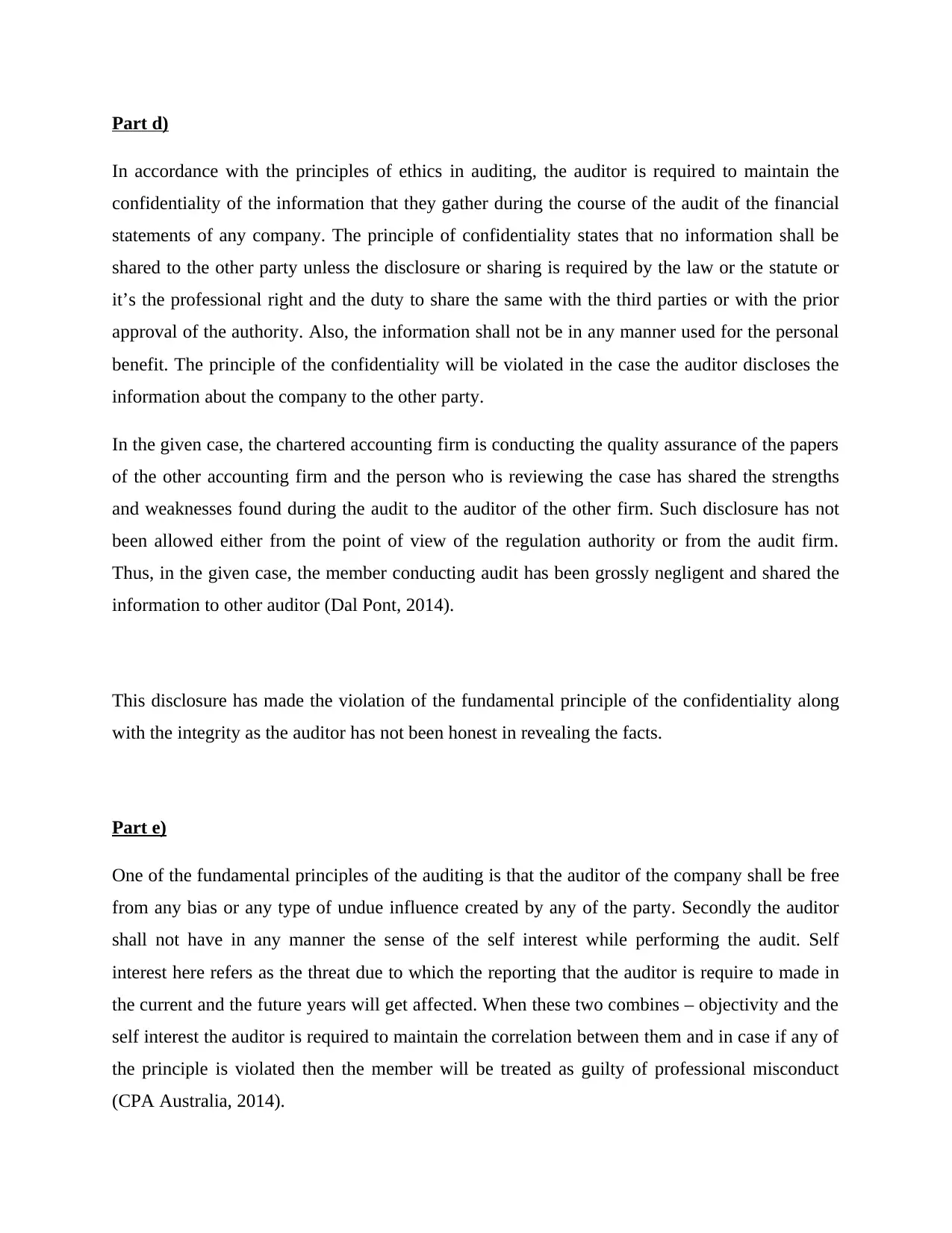
Part d)
In accordance with the principles of ethics in auditing, the auditor is required to maintain the
confidentiality of the information that they gather during the course of the audit of the financial
statements of any company. The principle of confidentiality states that no information shall be
shared to the other party unless the disclosure or sharing is required by the law or the statute or
it’s the professional right and the duty to share the same with the third parties or with the prior
approval of the authority. Also, the information shall not be in any manner used for the personal
benefit. The principle of the confidentiality will be violated in the case the auditor discloses the
information about the company to the other party.
In the given case, the chartered accounting firm is conducting the quality assurance of the papers
of the other accounting firm and the person who is reviewing the case has shared the strengths
and weaknesses found during the audit to the auditor of the other firm. Such disclosure has not
been allowed either from the point of view of the regulation authority or from the audit firm.
Thus, in the given case, the member conducting audit has been grossly negligent and shared the
information to other auditor (Dal Pont, 2014).
This disclosure has made the violation of the fundamental principle of the confidentiality along
with the integrity as the auditor has not been honest in revealing the facts.
Part e)
One of the fundamental principles of the auditing is that the auditor of the company shall be free
from any bias or any type of undue influence created by any of the party. Secondly the auditor
shall not have in any manner the sense of the self interest while performing the audit. Self
interest here refers as the threat due to which the reporting that the auditor is require to made in
the current and the future years will get affected. When these two combines – objectivity and the
self interest the auditor is required to maintain the correlation between them and in case if any of
the principle is violated then the member will be treated as guilty of professional misconduct
(CPA Australia, 2014).
In accordance with the principles of ethics in auditing, the auditor is required to maintain the
confidentiality of the information that they gather during the course of the audit of the financial
statements of any company. The principle of confidentiality states that no information shall be
shared to the other party unless the disclosure or sharing is required by the law or the statute or
it’s the professional right and the duty to share the same with the third parties or with the prior
approval of the authority. Also, the information shall not be in any manner used for the personal
benefit. The principle of the confidentiality will be violated in the case the auditor discloses the
information about the company to the other party.
In the given case, the chartered accounting firm is conducting the quality assurance of the papers
of the other accounting firm and the person who is reviewing the case has shared the strengths
and weaknesses found during the audit to the auditor of the other firm. Such disclosure has not
been allowed either from the point of view of the regulation authority or from the audit firm.
Thus, in the given case, the member conducting audit has been grossly negligent and shared the
information to other auditor (Dal Pont, 2014).
This disclosure has made the violation of the fundamental principle of the confidentiality along
with the integrity as the auditor has not been honest in revealing the facts.
Part e)
One of the fundamental principles of the auditing is that the auditor of the company shall be free
from any bias or any type of undue influence created by any of the party. Secondly the auditor
shall not have in any manner the sense of the self interest while performing the audit. Self
interest here refers as the threat due to which the reporting that the auditor is require to made in
the current and the future years will get affected. When these two combines – objectivity and the
self interest the auditor is required to maintain the correlation between them and in case if any of
the principle is violated then the member will be treated as guilty of professional misconduct
(CPA Australia, 2014).
⊘ This is a preview!⊘
Do you want full access?
Subscribe today to unlock all pages.

Trusted by 1+ million students worldwide
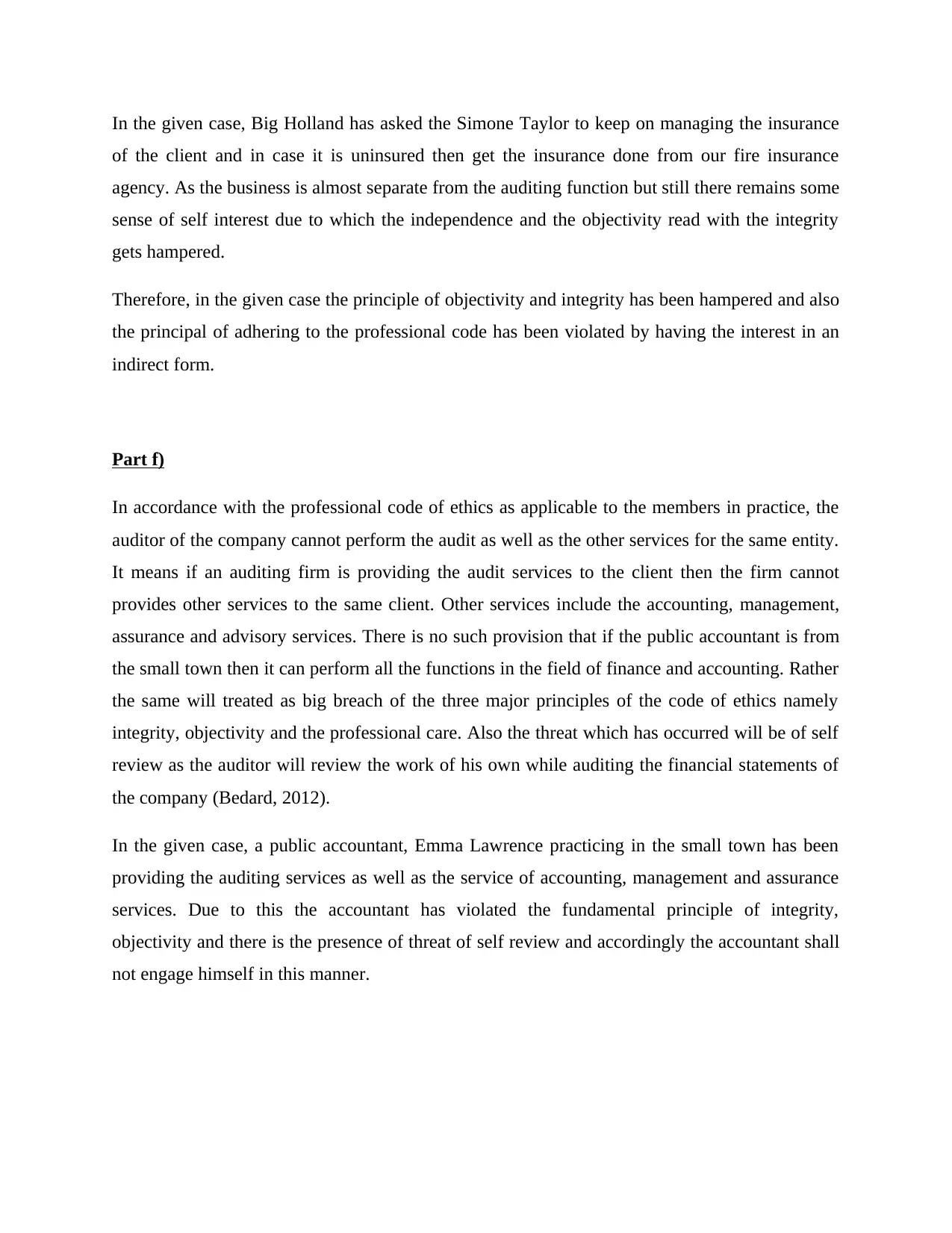
In the given case, Big Holland has asked the Simone Taylor to keep on managing the insurance
of the client and in case it is uninsured then get the insurance done from our fire insurance
agency. As the business is almost separate from the auditing function but still there remains some
sense of self interest due to which the independence and the objectivity read with the integrity
gets hampered.
Therefore, in the given case the principle of objectivity and integrity has been hampered and also
the principal of adhering to the professional code has been violated by having the interest in an
indirect form.
Part f)
In accordance with the professional code of ethics as applicable to the members in practice, the
auditor of the company cannot perform the audit as well as the other services for the same entity.
It means if an auditing firm is providing the audit services to the client then the firm cannot
provides other services to the same client. Other services include the accounting, management,
assurance and advisory services. There is no such provision that if the public accountant is from
the small town then it can perform all the functions in the field of finance and accounting. Rather
the same will treated as big breach of the three major principles of the code of ethics namely
integrity, objectivity and the professional care. Also the threat which has occurred will be of self
review as the auditor will review the work of his own while auditing the financial statements of
the company (Bedard, 2012).
In the given case, a public accountant, Emma Lawrence practicing in the small town has been
providing the auditing services as well as the service of accounting, management and assurance
services. Due to this the accountant has violated the fundamental principle of integrity,
objectivity and there is the presence of threat of self review and accordingly the accountant shall
not engage himself in this manner.
of the client and in case it is uninsured then get the insurance done from our fire insurance
agency. As the business is almost separate from the auditing function but still there remains some
sense of self interest due to which the independence and the objectivity read with the integrity
gets hampered.
Therefore, in the given case the principle of objectivity and integrity has been hampered and also
the principal of adhering to the professional code has been violated by having the interest in an
indirect form.
Part f)
In accordance with the professional code of ethics as applicable to the members in practice, the
auditor of the company cannot perform the audit as well as the other services for the same entity.
It means if an auditing firm is providing the audit services to the client then the firm cannot
provides other services to the same client. Other services include the accounting, management,
assurance and advisory services. There is no such provision that if the public accountant is from
the small town then it can perform all the functions in the field of finance and accounting. Rather
the same will treated as big breach of the three major principles of the code of ethics namely
integrity, objectivity and the professional care. Also the threat which has occurred will be of self
review as the auditor will review the work of his own while auditing the financial statements of
the company (Bedard, 2012).
In the given case, a public accountant, Emma Lawrence practicing in the small town has been
providing the auditing services as well as the service of accounting, management and assurance
services. Due to this the accountant has violated the fundamental principle of integrity,
objectivity and there is the presence of threat of self review and accordingly the accountant shall
not engage himself in this manner.
Paraphrase This Document
Need a fresh take? Get an instant paraphrase of this document with our AI Paraphraser
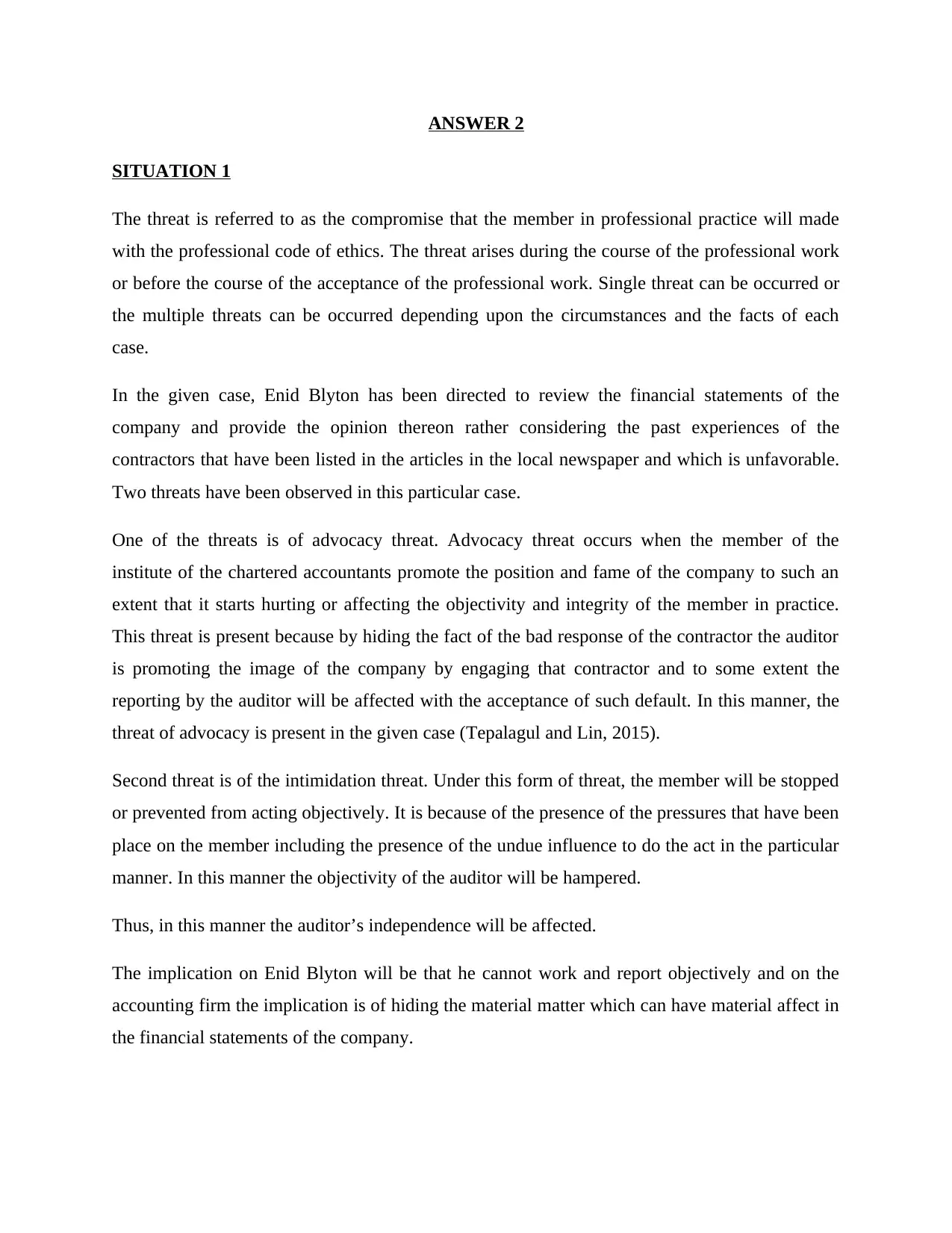
ANSWER 2
SITUATION 1
The threat is referred to as the compromise that the member in professional practice will made
with the professional code of ethics. The threat arises during the course of the professional work
or before the course of the acceptance of the professional work. Single threat can be occurred or
the multiple threats can be occurred depending upon the circumstances and the facts of each
case.
In the given case, Enid Blyton has been directed to review the financial statements of the
company and provide the opinion thereon rather considering the past experiences of the
contractors that have been listed in the articles in the local newspaper and which is unfavorable.
Two threats have been observed in this particular case.
One of the threats is of advocacy threat. Advocacy threat occurs when the member of the
institute of the chartered accountants promote the position and fame of the company to such an
extent that it starts hurting or affecting the objectivity and integrity of the member in practice.
This threat is present because by hiding the fact of the bad response of the contractor the auditor
is promoting the image of the company by engaging that contractor and to some extent the
reporting by the auditor will be affected with the acceptance of such default. In this manner, the
threat of advocacy is present in the given case (Tepalagul and Lin, 2015).
Second threat is of the intimidation threat. Under this form of threat, the member will be stopped
or prevented from acting objectively. It is because of the presence of the pressures that have been
place on the member including the presence of the undue influence to do the act in the particular
manner. In this manner the objectivity of the auditor will be hampered.
Thus, in this manner the auditor’s independence will be affected.
The implication on Enid Blyton will be that he cannot work and report objectively and on the
accounting firm the implication is of hiding the material matter which can have material affect in
the financial statements of the company.
SITUATION 1
The threat is referred to as the compromise that the member in professional practice will made
with the professional code of ethics. The threat arises during the course of the professional work
or before the course of the acceptance of the professional work. Single threat can be occurred or
the multiple threats can be occurred depending upon the circumstances and the facts of each
case.
In the given case, Enid Blyton has been directed to review the financial statements of the
company and provide the opinion thereon rather considering the past experiences of the
contractors that have been listed in the articles in the local newspaper and which is unfavorable.
Two threats have been observed in this particular case.
One of the threats is of advocacy threat. Advocacy threat occurs when the member of the
institute of the chartered accountants promote the position and fame of the company to such an
extent that it starts hurting or affecting the objectivity and integrity of the member in practice.
This threat is present because by hiding the fact of the bad response of the contractor the auditor
is promoting the image of the company by engaging that contractor and to some extent the
reporting by the auditor will be affected with the acceptance of such default. In this manner, the
threat of advocacy is present in the given case (Tepalagul and Lin, 2015).
Second threat is of the intimidation threat. Under this form of threat, the member will be stopped
or prevented from acting objectively. It is because of the presence of the pressures that have been
place on the member including the presence of the undue influence to do the act in the particular
manner. In this manner the objectivity of the auditor will be hampered.
Thus, in this manner the auditor’s independence will be affected.
The implication on Enid Blyton will be that he cannot work and report objectively and on the
accounting firm the implication is of hiding the material matter which can have material affect in
the financial statements of the company.
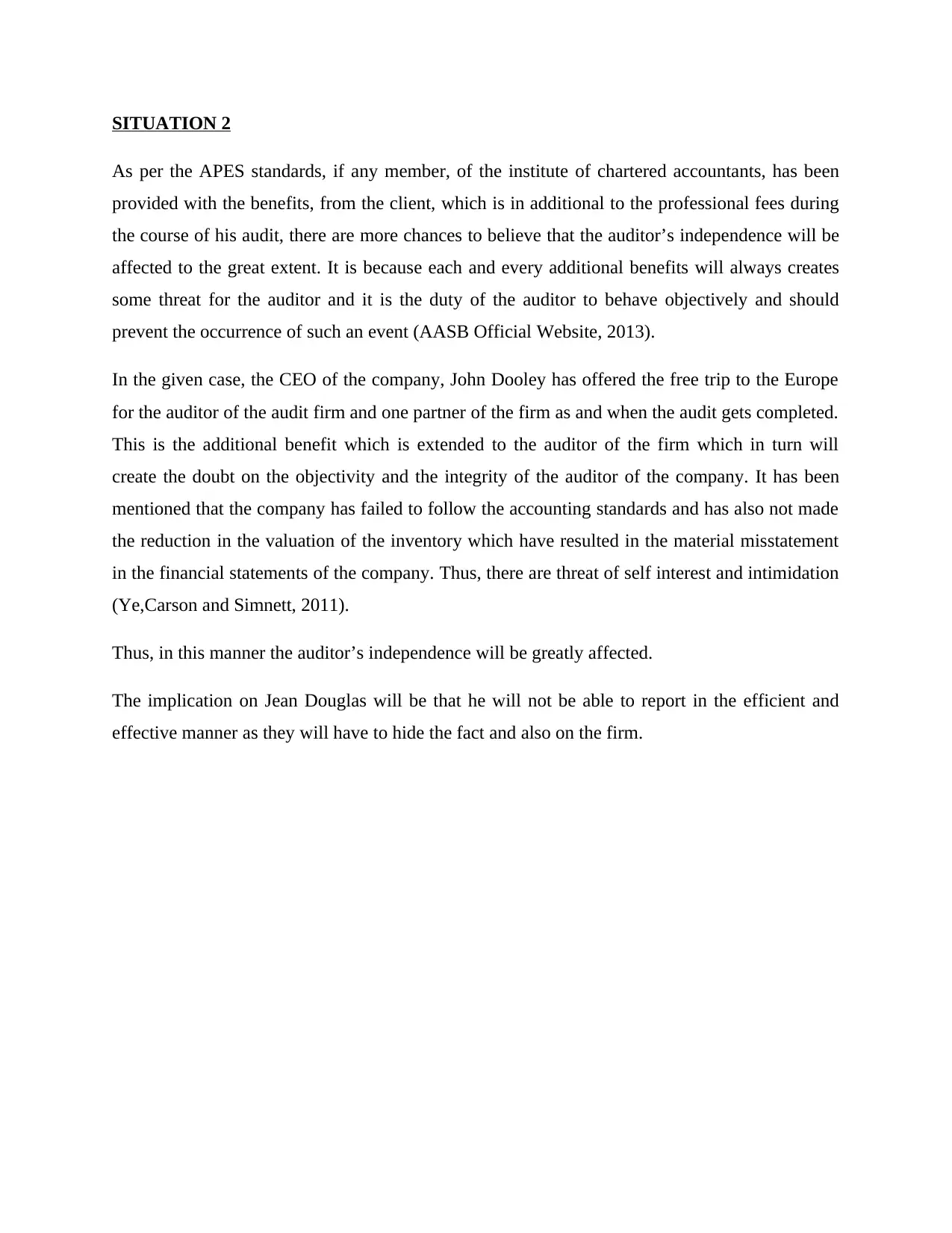
SITUATION 2
As per the APES standards, if any member, of the institute of chartered accountants, has been
provided with the benefits, from the client, which is in additional to the professional fees during
the course of his audit, there are more chances to believe that the auditor’s independence will be
affected to the great extent. It is because each and every additional benefits will always creates
some threat for the auditor and it is the duty of the auditor to behave objectively and should
prevent the occurrence of such an event (AASB Official Website, 2013).
In the given case, the CEO of the company, John Dooley has offered the free trip to the Europe
for the auditor of the audit firm and one partner of the firm as and when the audit gets completed.
This is the additional benefit which is extended to the auditor of the firm which in turn will
create the doubt on the objectivity and the integrity of the auditor of the company. It has been
mentioned that the company has failed to follow the accounting standards and has also not made
the reduction in the valuation of the inventory which have resulted in the material misstatement
in the financial statements of the company. Thus, there are threat of self interest and intimidation
(Ye,Carson and Simnett, 2011).
Thus, in this manner the auditor’s independence will be greatly affected.
The implication on Jean Douglas will be that he will not be able to report in the efficient and
effective manner as they will have to hide the fact and also on the firm.
As per the APES standards, if any member, of the institute of chartered accountants, has been
provided with the benefits, from the client, which is in additional to the professional fees during
the course of his audit, there are more chances to believe that the auditor’s independence will be
affected to the great extent. It is because each and every additional benefits will always creates
some threat for the auditor and it is the duty of the auditor to behave objectively and should
prevent the occurrence of such an event (AASB Official Website, 2013).
In the given case, the CEO of the company, John Dooley has offered the free trip to the Europe
for the auditor of the audit firm and one partner of the firm as and when the audit gets completed.
This is the additional benefit which is extended to the auditor of the firm which in turn will
create the doubt on the objectivity and the integrity of the auditor of the company. It has been
mentioned that the company has failed to follow the accounting standards and has also not made
the reduction in the valuation of the inventory which have resulted in the material misstatement
in the financial statements of the company. Thus, there are threat of self interest and intimidation
(Ye,Carson and Simnett, 2011).
Thus, in this manner the auditor’s independence will be greatly affected.
The implication on Jean Douglas will be that he will not be able to report in the efficient and
effective manner as they will have to hide the fact and also on the firm.
⊘ This is a preview!⊘
Do you want full access?
Subscribe today to unlock all pages.

Trusted by 1+ million students worldwide
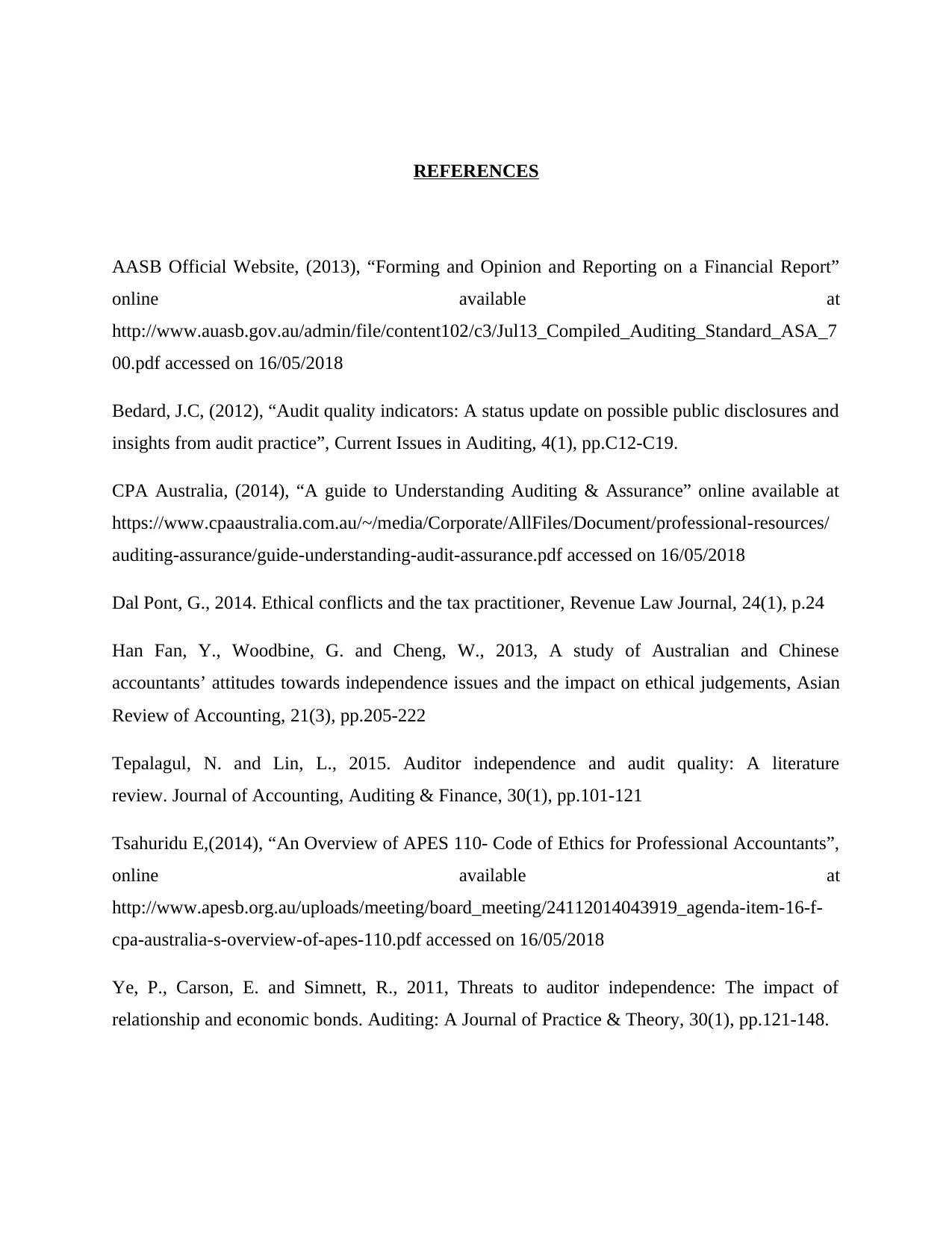
REFERENCES
AASB Official Website, (2013), “Forming and Opinion and Reporting on a Financial Report”
online available at
http://www.auasb.gov.au/admin/file/content102/c3/Jul13_Compiled_Auditing_Standard_ASA_7
00.pdf accessed on 16/05/2018
Bedard, J.C, (2012), “Audit quality indicators: A status update on possible public disclosures and
insights from audit practice”, Current Issues in Auditing, 4(1), pp.C12-C19.
CPA Australia, (2014), “A guide to Understanding Auditing & Assurance” online available at
https://www.cpaaustralia.com.au/~/media/Corporate/AllFiles/Document/professional-resources/
auditing-assurance/guide-understanding-audit-assurance.pdf accessed on 16/05/2018
Dal Pont, G., 2014. Ethical conflicts and the tax practitioner, Revenue Law Journal, 24(1), p.24
Han Fan, Y., Woodbine, G. and Cheng, W., 2013, A study of Australian and Chinese
accountants’ attitudes towards independence issues and the impact on ethical judgements, Asian
Review of Accounting, 21(3), pp.205-222
Tepalagul, N. and Lin, L., 2015. Auditor independence and audit quality: A literature
review. Journal of Accounting, Auditing & Finance, 30(1), pp.101-121
Tsahuridu E,(2014), “An Overview of APES 110- Code of Ethics for Professional Accountants”,
online available at
http://www.apesb.org.au/uploads/meeting/board_meeting/24112014043919_agenda-item-16-f-
cpa-australia-s-overview-of-apes-110.pdf accessed on 16/05/2018
Ye, P., Carson, E. and Simnett, R., 2011, Threats to auditor independence: The impact of
relationship and economic bonds. Auditing: A Journal of Practice & Theory, 30(1), pp.121-148.
AASB Official Website, (2013), “Forming and Opinion and Reporting on a Financial Report”
online available at
http://www.auasb.gov.au/admin/file/content102/c3/Jul13_Compiled_Auditing_Standard_ASA_7
00.pdf accessed on 16/05/2018
Bedard, J.C, (2012), “Audit quality indicators: A status update on possible public disclosures and
insights from audit practice”, Current Issues in Auditing, 4(1), pp.C12-C19.
CPA Australia, (2014), “A guide to Understanding Auditing & Assurance” online available at
https://www.cpaaustralia.com.au/~/media/Corporate/AllFiles/Document/professional-resources/
auditing-assurance/guide-understanding-audit-assurance.pdf accessed on 16/05/2018
Dal Pont, G., 2014. Ethical conflicts and the tax practitioner, Revenue Law Journal, 24(1), p.24
Han Fan, Y., Woodbine, G. and Cheng, W., 2013, A study of Australian and Chinese
accountants’ attitudes towards independence issues and the impact on ethical judgements, Asian
Review of Accounting, 21(3), pp.205-222
Tepalagul, N. and Lin, L., 2015. Auditor independence and audit quality: A literature
review. Journal of Accounting, Auditing & Finance, 30(1), pp.101-121
Tsahuridu E,(2014), “An Overview of APES 110- Code of Ethics for Professional Accountants”,
online available at
http://www.apesb.org.au/uploads/meeting/board_meeting/24112014043919_agenda-item-16-f-
cpa-australia-s-overview-of-apes-110.pdf accessed on 16/05/2018
Ye, P., Carson, E. and Simnett, R., 2011, Threats to auditor independence: The impact of
relationship and economic bonds. Auditing: A Journal of Practice & Theory, 30(1), pp.121-148.
1 out of 7
Related Documents
Your All-in-One AI-Powered Toolkit for Academic Success.
+13062052269
info@desklib.com
Available 24*7 on WhatsApp / Email
![[object Object]](/_next/static/media/star-bottom.7253800d.svg)
Unlock your academic potential
Copyright © 2020–2026 A2Z Services. All Rights Reserved. Developed and managed by ZUCOL.



